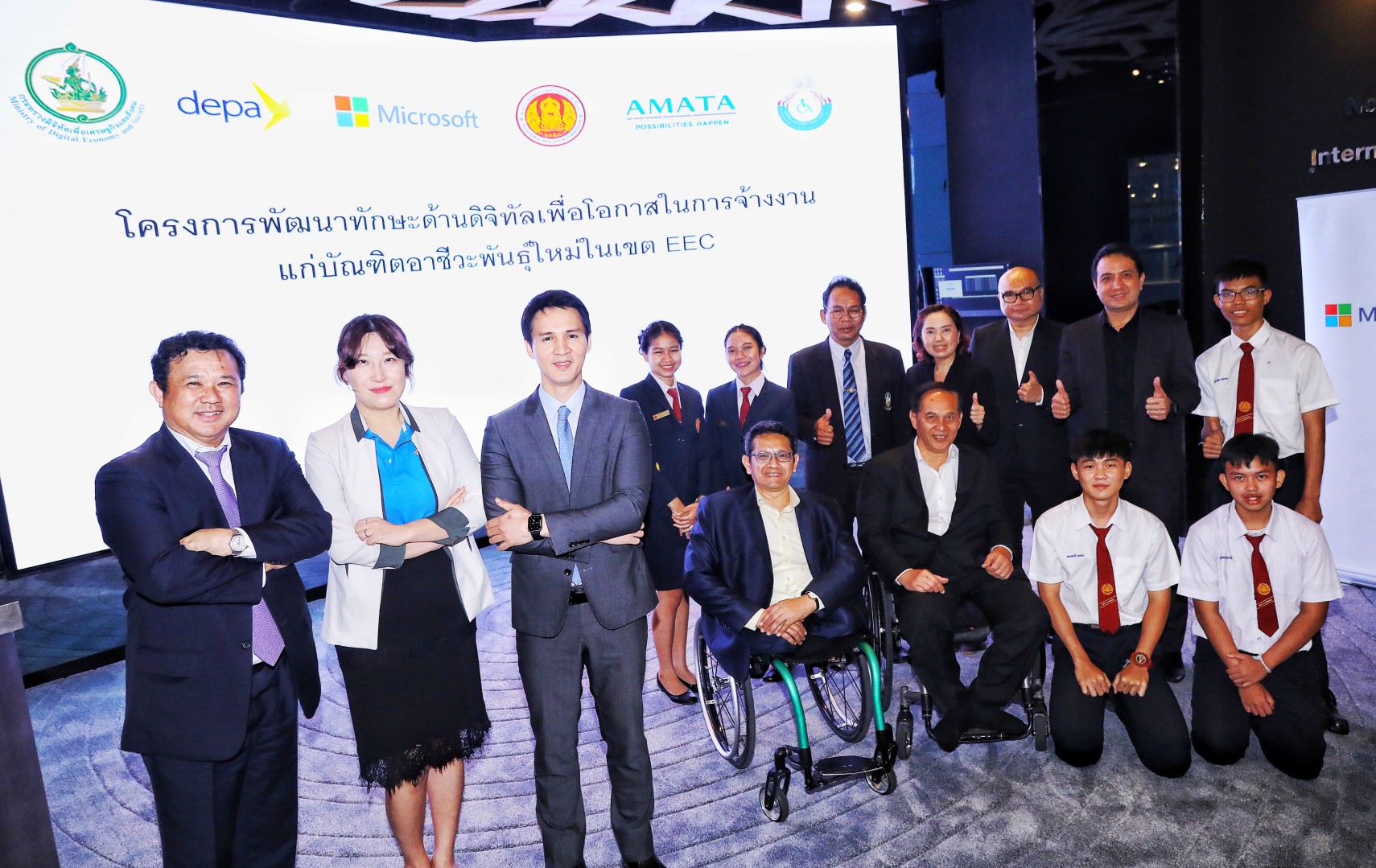Program to provide digital skill training for 6,000 vocational school graduates from 60 institutes through partnership between 6 organizations – including Microsoft, depa, Office of Vocational Education Commission, Pattaya Redemptorist Technological College for People with Disabilities, Amata Corporation and LinkedIn Thailand
Bangkok – 3 March 2020 – Microsoft (Thailand), in partnership with the Digital Economy Promotion Agency, Office of Vocational Education Commission, Pattaya Redemptorist Technological College for People with Disabilities, Amata Corporation and LinkedIn Thailand, recently launched the “Advancing the Future of Work” program, which seeks to close the digital skills gap and enhance employability of a new generation of 6,000 vocational school graduates in Chachoengsao, Chonburi and Rayong with in-demand digital skills that employers are looking for. These skills will be delivered through training sessions for 120 vocational school teachers from 60 institutes in Eastern Economic Corridor (EEC), with additional learning opportunities that best prepare people for the future of work through online courses on the Future Ready ASEAN platform.
Microsoft’s mission covers supporting the development of a digital economy that benefits everyone by driving technology forward without leaving anyone behind. Thus, the company collaborated with 5 other partners to upskill vocational school graduates and help them get ready for their future careers through a ‘train the trainers’ approach. Their teachers are receiving aid in elevating digital skills teaching competencies through two programs – Digital Diploma – Business Data Analytic Training, a 3-day training course on advanced Excel and Power BI, and Digital Diploma – Programming Training, a 2-day training course on HTML5 and CSS.

Ms. Jin Hee Bae, Microsoft Philanthropies Lead, APAC said, “AI is a transformative technology that will result in major economic gains, raising overall productivity and income across APAC. In Southeast Asia, firms that proactively adopt AI reported up to 15% higher profit margins than the industry average across different sectors, while AI adoption is described to have risen rapidly in a short period of time – from 8% of businesses in 2017 to 14% in 2018. Thus, Microsoft realizes the importance of helping vocational school graduates get ready, to increase their competitiveness and boosting necessary digital skills required to succeed in the future”.
According to a study[1], the top 3 sectors facing the highest level of job displacement from the impact of AI and automation by 2028 are agriculture (15%), manufacturing (12%) and wholesale and retail (10%). All three industries share one thing in common: they all involve a high proportion of routine and repetitive tasks.
Dr. Ratthasart Korrasud, Senior Executive Vice President, Digital Economy Promotion Agency, said, “DEPA aims to develop digital skills for people from all walks of life to elevate the potential of the workforce. This not only improves the ability to fulfill industrial sector workforce demands but also reduces unemployment. According to a survey regarding employment statuses of the population conducted by the National Statistical Office (as of December 2019), there were 367,000 unemployed people out of a total of 38.21 million people in the active workforce, with 5% being people aged between 15-24 years old. By education level, there were 148,000 unemployed people who were higher education graduates (1.8%), and 76,000 unemployed people with high school degree or equivalent (1.2%). This reflects the unemployment issues among to day’s fresh graduates or first jobbers, and the challenges in developing a workforce that meet modern demands – especially when it comes to equipping students with digital skills before entering the job market. This partnership to train vocation school graduates in digital skills will also help them develop analytical and coding skills to create applications, a talent that is in high demand. Vocational school teachers from 60 institutes who are participating in the program will become important personnel with responsibilities to pass on the knowledge and skills to over 6,000 vocational school students before their graduation, helping them get ready before entering the job market and lowering the unemployment rate.”
day’s fresh graduates or first jobbers, and the challenges in developing a workforce that meet modern demands – especially when it comes to equipping students with digital skills before entering the job market. This partnership to train vocation school graduates in digital skills will also help them develop analytical and coding skills to create applications, a talent that is in high demand. Vocational school teachers from 60 institutes who are participating in the program will become important personnel with responsibilities to pass on the knowledge and skills to over 6,000 vocational school students before their graduation, helping them get ready before entering the job market and lowering the unemployment rate.”
Vocational school graduates will gain knowledge and skills from their educators and will also be provided online learning opportunities on the Future Ready ASEAN website, which was established in partnership with the ASEAN Foundation. In addition, after completing the courses, they will receive certificates in recognition of digital skills gained through the program, specially designed under a partnership of 6 organizations, with job opportunities at Amata Corporation.
 Mr. Viboon Kromadit, Director and Chief Marketing Officer Amata Corporation PCL., said, “Currently, Amata operates two industrial estates in Chonburi and Rayong, covering a total of over 1,200 factories and making them sizable providers of job opportunities in the country. Employers are looking for new hires in manufacturing, supervisory roles, technicians, office workers and other positions in several sectors, including technical experts, to support the growth and adaptability of digital operations driven by robots and AI in production and quality control. Hence, creating sufficient workforce equipped with digital skills to serve the demand in the industrial sector is crucial in order to upgrade the business competency. I am delighted for the opportunity to support the program, and I hope that Amata Corporation will be able to create quality personnel through this program to enhance the manufacturing industry in the future.”
Mr. Viboon Kromadit, Director and Chief Marketing Officer Amata Corporation PCL., said, “Currently, Amata operates two industrial estates in Chonburi and Rayong, covering a total of over 1,200 factories and making them sizable providers of job opportunities in the country. Employers are looking for new hires in manufacturing, supervisory roles, technicians, office workers and other positions in several sectors, including technical experts, to support the growth and adaptability of digital operations driven by robots and AI in production and quality control. Hence, creating sufficient workforce equipped with digital skills to serve the demand in the industrial sector is crucial in order to upgrade the business competency. I am delighted for the opportunity to support the program, and I hope that Amata Corporation will be able to create quality personnel through this program to enhance the manufacturing industry in the future.”
 Mr. Sittisak Noisapung, a 2nd-year vocational school student in Electronics major from Science-Based Technology Vocational College (Chonburi), said, “My major is electronics and I’ve always dreamed of getting a job in a maintenance department in one of the factories in Amata Corporation’s industrial estates when I graduate. I’ve noticed that in the past few years, a lot of factories have brought technology in to enhance the performance of their operations. I feel that digital skills are truly necessary and will be an important qualification that employers consider when hiring new staff as these skills can be utilized to control technologies used in the factories.”
Mr. Sittisak Noisapung, a 2nd-year vocational school student in Electronics major from Science-Based Technology Vocational College (Chonburi), said, “My major is electronics and I’ve always dreamed of getting a job in a maintenance department in one of the factories in Amata Corporation’s industrial estates when I graduate. I’ve noticed that in the past few years, a lot of factories have brought technology in to enhance the performance of their operations. I feel that digital skills are truly necessary and will be an important qualification that employers consider when hiring new staff as these skills can be utilized to control technologies used in the factories.”
 Ms. Onwaree Srimaya, a 2nd-year vocational school student in Computer Science major from Eastern College of Technology (E. Tech), said, “I think equipping myself with digital skills is an important element of the preparation before I start my own career. With these skills, I will be more competitive in the job market and have a higher chance of getting hired by employers. I currently major in Computer Science and hope to get a job in an IT Department in the future. I think the digital skills that I will gain from the program will add to what I’ve learned in school and expand my capabilities with additional knowledge in analytics and coding for app development.”
Ms. Onwaree Srimaya, a 2nd-year vocational school student in Computer Science major from Eastern College of Technology (E. Tech), said, “I think equipping myself with digital skills is an important element of the preparation before I start my own career. With these skills, I will be more competitive in the job market and have a higher chance of getting hired by employers. I currently major in Computer Science and hope to get a job in an IT Department in the future. I think the digital skills that I will gain from the program will add to what I’ve learned in school and expand my capabilities with additional knowledge in analytics and coding for app development.”
[1]Source: Oxford Economics and Cisco (2018), Technology and the future of ASEAN jobs

